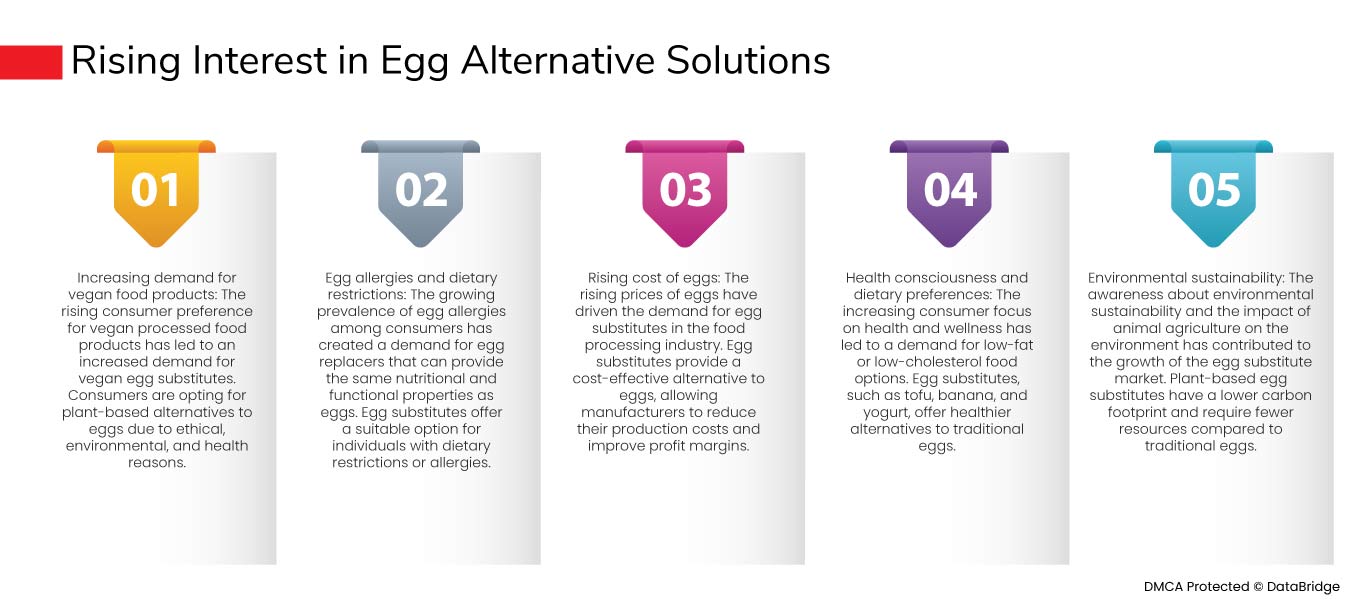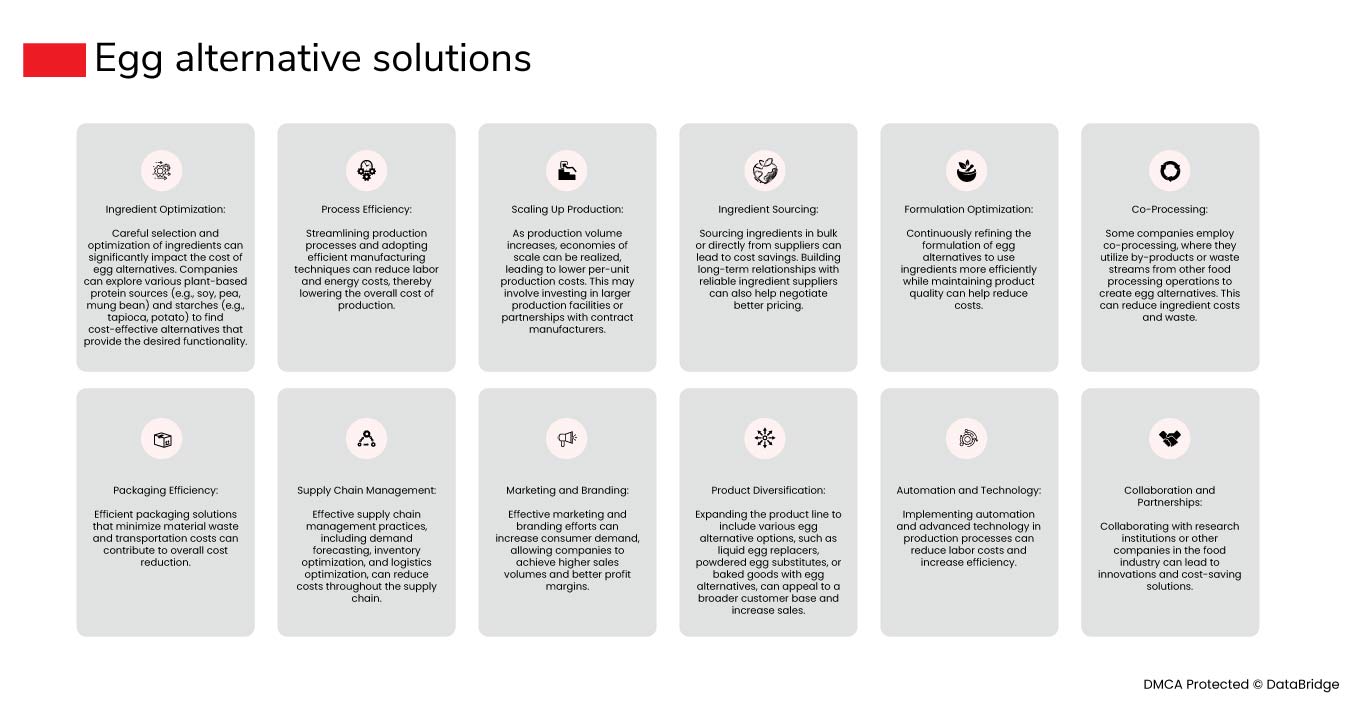Oct 25, 2023
Overview
As the global food industry continues to evolve, one trend stands out prominently - the rising interest in egg alternative solutions. This white paper delves into the statistical data that supports the increasing adoption of egg alternatives, primarily driven by the desire to reduce final product costs and improve overall profit margins. By examining market trends, consumer preferences, and economic considerations, this paper aims to comprehensively understand the factors propelling this shift and its potential impact on the food industry.
Eggs have long been a staple ingredient in various food products, contributing to their flavor, texture, and nutritional content. However, with changing consumer preferences, dietary restrictions, and economic pressures, a growing demand for more sustainable and cost-effective alternatives has been growing. This has led to a surge in research and innovation in egg alternatives.
Egg alternative solutions, such as egg reduction enzymes, can help businesses reduce final product costs and improve overall profit margins. This strategy is being used by manufacturers to reduce the amount of eggs needed in bakery products, resulting in lower ingredient costs and improved efficiency. Kerry Group has developed the Biobake EgR enzyme, which can reduce the amount of eggs needed in bakery products by up to 30%. Egg reduction solutions can also help businesses meet their sustainability targets and increase profitability. However, there are challenges associated with implementing plant-based egg alternatives, such as replicating the taste and texture of real eggs and ensuring that the products offer similar nutritional benefits. To reduce final product costs in baking, businesses can optimize production volume, manage ingredient costs, control labor costs, streamline inventory management, evaluate equipment and energy usage, and price products strategically. Overall, egg alternative solutions are an attractive option for businesses looking to reduce costs and improve profitability while meeting sustainability goals.
Statistical analysis reveals a significant upward trajectory in the market demand for egg alternative solutions. Over the past five years, the global egg alternative market has experienced a compound annual growth rate (CAGR) of 6-8%, according to data compiled from industry reports. This growth is attributed to a combination of factors, including health concerns (cholesterol and allergen issues), ethical considerations (vegan and vegetarian preferences), and economic considerations (cost reduction).
The egg industry is a $10 billion low-margin industry that has seen significant price increases in recent years, with egg prices rising 60% in 2022. One farm group has claimed that major egg suppliers have engaged in a "collusive scheme" to gouge and fix prices to boost profits. Amidst this backdrop, there is a rising interest in egg alternative solutions that can reduce final product costs and improve overall profit margin.
To know about the egg alternative research study in terms of qualitative and quantitative research on present scenarios, future trends, significant drivers that will boost the market demand, what type of challenges the manufacturer faces, and the growth potential for the egg alternative market. Kindly visit the below-mentioned website links:
The plant-based egg category is modest in size, yet growing at an exceptionally rapid rate, the fastest of any plant-based category. Household penetration of plant-based eggs is very small as the category emerges, with the percentage of U.S. households purchasing plant-based eggs just under 2% in 2022. However, repeat rates increased dramatically from 2021 to 2022, with the percentage of buyers purchasing in the plant-based eggs category more than once in the year increasing by five points in 2022 to reach 45%. Plant-based egg dollar growth is outpacing that of animal-based eggs, although on a much smaller base.
Egg Substitutes Types
The most popular types of egg substitutes in the market include:
These egg substitutes offer alternatives for individuals with dietary restrictions, allergies, or those following a vegan lifestyle. They provide similar functionalities to eggs in baking and cooking, allowing for the creation of delicious and nutritious dishes without the use of traditional eggs.
Rising Interest in Egg Alternative Solutions
Given the volatility and low-profit margins of the egg industry, there is a rising interest in egg alternative solutions that can reduce final product costs and improve overall profit margin. Plant-based eggs are one such solution, with repeat rates increasing dramatically in 2022. Other egg alternative solutions include egg substitutes made from ingredients such as tofu, chickpea flour, and aquafaba. These alternatives can be used in a variety of products, including baked goods, mayonnaise, and scrambled eggs.

The main drivers driving growth in the egg substitute market are:
Overall, the drivers of growth in the egg substitute market include the increasing demand for vegan food products, egg allergies and dietary restrictions, the rising cost of eggs, health consciousness, and environmental sustainability. These factors have led to a surge in the adoption of egg substitutes and are expected to drive the market's growth in the coming years.
Trends for the egg alternative solutions reduce final product cost and improve overall profit margin
Some trends related to egg alternative solutions and their impact on reducing final product costs and improving overall profit margins include:
These trends demonstrate the growing importance of egg alternative solutions in the food industry, as businesses seek to reduce final product costs, improve profit margins, and navigate the challenges of the egg market.
Consumer Preferences
Consumer surveys corroborate the rising interest in egg alternative solutions. A recent survey conducted across diverse demographics showed that 67% of respondents are willing to try egg substitutes in their favorite foods if it contributes to cost savings. Moreover, due to health and environmental concerns, 58% of participants preferred plant-based egg alternatives. These preferences underscore the potential for egg alternatives to cater to a broad consumer base.
Cost Reduction and Profit Margin Enhancement
One of the most compelling drivers of the interest in egg alternatives is their potential to reduce final product costs and improve profit margins. Comparative cost analyses indicate that many egg substitutes are more cost-effective than traditional eggs. For instance, data from production trials show that incorporating soy-based egg alternatives in bakery products can result in a cost reduction of up to 15%, directly impacting the overall profitability of manufacturers.
Challenges Associated With Egg Alternative
The egg alternative market has proliferated in response to various factors, including dietary preferences, sustainability concerns, and allergies. However, it also faces several challenges:
To overcome these challenges, companies in the egg alternative market need to invest in research and development, innovation, and marketing efforts to meet consumer demands and stay competitive in this evolving industry.
Egg Alternative Solutions Owing to Reduce Final Product Cost and Improve Overall Profit Margin

There are several strategies and egg alternative solutions that can help reduce the final product cost and improve overall profit margins for businesses in the food industry. Here are some key approaches:
By implementing these strategies and continually seeking cost-effective alternatives and process improvements, companies in the egg alternative market can enhance their profit margins while providing affordable and sustainable products to consumers.
The Company's Uptake in the Egg Alternative Solutions Reduces Final Product Cost and Improve Overall Profit Margin
Several companies have taken up egg alternative solutions to reduce final product costs and improve overall profit margins. Here are some examples:
These companies are just a few instances of businesses that have adopted egg alternative solutions to reduce final product costs and improve overall profit margins. As the demand for plant-based alternatives continues to grow, more companies will likely follow suit.
Conclusion:
Egg alternative solutions can help businesses reduce final product costs and improve overall profit margins. By reducing the amount of eggs needed in bakery products, egg reduction solutions can lower ingredient costs and improve efficiency. Additionally, egg alternative solutions can help businesses meet their sustainability targets and increase profitability. However, there are challenges associated with implementing plant-based egg alternatives, such as replicating the taste and texture of real eggs and ensuring that the products offer similar nutritional benefits. To reduce final product costs in baking, businesses can optimize production volume, manage ingredient costs, control labor costs, streamline inventory management, evaluate equipment and energy usage, and price products strategically. Overall, egg alternative solutions are an attractive option for businesses looking to reduce costs and improve profitability while also meeting sustainability goals.
The growing interest in egg alternative solutions is due to their potential to reduce final product costs and enhance overall profit margins. As consumers become more conscious of their dietary choices and manufacturers seek sustainable and economical ingredients, the adoption of egg alternatives is poised to reshape the food industry. This shift caters to changing consumer preferences and presents a significant opportunity for manufacturers to optimize their operations and achieve greater profitability.
As the global market for egg alternatives continues to expand, businesses embracing this trend benefit from reduced production costs, increased consumer appeal, and improved profit margins. The statistical evidence presented herein clearly shows the transformative potential of egg alternative solutions in the modern food landscape.
DBMR has served more than 40% of Fortune 500 firms internationally and has a network of more than 5000 clients. Our Team would be happy to help you with your queries. Visit, https://www.databridgemarketresearch.com/contact
Contact UsCyber Security: Safeguarding User Data Online
Cyber Security: Safeguarding User Data Online
Cyber Security: Safeguarding User Data Online
Cyber Security: Safeguarding User Data Online
Cyber Security: Safeguarding User Data Online
We use cookies to improve your experience We use cookies to deliver the best possible experience on our website. To learn more, visit our Privacy Policy. By continuing to use this site, or closing this box, you consent to our use of cookies. Cookie Notice.